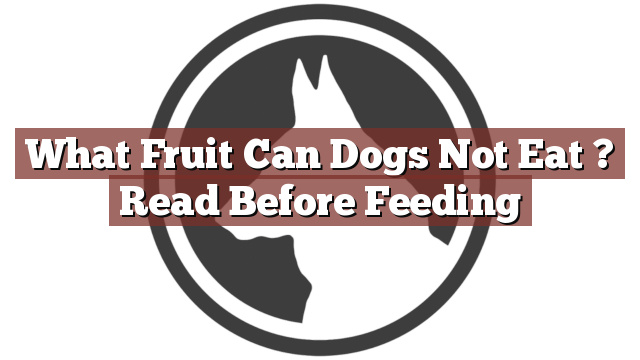Understanding Your Dog’s Dietary Needs
Proper nutrition plays a crucial role in keeping our furry friends healthy and happy. As responsible pet owners, it is important to understand our dog’s dietary needs to provide them with a balanced and nutritious diet. While dogs are primarily carnivores, they can also benefit from certain fruits and vegetables. However, it is important to note that not all fruits are safe for our canine companions. Before introducing any new food into their diet, it is essential to do thorough research and consult with your veterinarian.
What Fruit Can Dogs Not Eat? Read Before Feeding
As mentioned earlier, not all fruits are safe for dogs to consume. Some fruits can be toxic to them and can cause serious health issues. It is crucial to be aware of what fruits should be avoided to ensure the well-being of our furry friends. Here are some fruits that dogs should not eat:
-
Grapes and Raisins – Grapes and raisins can be extremely toxic to dogs, even in small quantities. They can lead to kidney failure and can be potentially fatal.
-
Avocado – While avocados are considered healthy for humans, they contain persin, a substance that can be toxic to dogs. It can cause vomiting, diarrhea, and pancreatitis.
-
Citrus Fruits – Citrus fruits like oranges, lemons, and limes are not recommended for dogs. The high acidity can cause an upset stomach and digestive issues.
-
Cherries – The pits of cherries contain cyanide, which is highly toxic for dogs. Additionally, the pits can pose a choking hazard or cause intestinal blockage.
-
Stone Fruits – Fruits with pits, such as peaches, plums, and apricots, should be avoided. The pits can be a choking hazard, and the fruit itself may cause gastrointestinal upset.
It is important to note that this is not an exhaustive list, and there may be other fruits that are not safe for dogs. Always research and consult with a veterinarian before introducing any new food into your dog’s diet.
Pros and Cons of Feeding Fruits to Dogs
Feeding fruits to dogs can have both benefits and drawbacks. Here are some pros and cons to consider:
Pros:
-
Nutritional Value – Certain fruits, such as blueberries and apples, are rich in vitamins, antioxidants, and fiber, which can be beneficial for dogs in moderation.
-
Hydration – Fruits with high water content, like watermelon and strawberries, can help keep your dog hydrated, especially during hot weather.
-
Treat Alternative – Fruits can serve as a healthy and natural alternative to store-bought treats, which may contain additives or preservatives.
Cons:
-
Digestive Issues – Some dogs may have sensitive stomachs and may experience digestive issues, such as diarrhea or upset stomach, when consuming certain fruits.
-
Caloric Intake – Fruits contain natural sugars and can contribute to your dog’s caloric intake. It is important to feed them in moderation to prevent weight gain.
-
Allergies – Just like humans, dogs can have allergies to certain fruits. Keep an eye out for any allergic reactions, such as itching, swelling, or difficulty breathing.
Conclusion: Making Informed Choices for Your Dog’s Health
While fruits can be a healthy addition to your dog’s diet, it is crucial to be aware of what fruits are safe and what should be avoided. Remember to always consult with your veterinarian before introducing any new food into your dog’s diet, especially if they have any underlying health conditions or allergies. By making informed choices, you can ensure that your furry friend receives a balanced and nutritious diet that contributes to their overall well-being and happiness.
Thank you for taking the time to read through our exploration of [page_title]. As every dog lover knows, our furry friends have unique dietary needs and responses, often varying from one canine to another. This is why it's paramount to approach any changes in their diet with caution and knowledge.
Before introducing any new treats or making alterations to your dog's diet based on our insights, it's crucial to consult with a veterinarian about [page_title]. Their expertise ensures that the choices you make are well-suited to your particular pet's health and well-being.
Even seemingly harmless foods can sometimes lead to allergic reactions or digestive issues, which is why monitoring your dog after introducing any new food item is essential.
The content provided here on [page_title] is crafted with care, thorough research, and a genuine love for dogs. Nevertheless, it serves as a general guideline and should not be considered a substitute for professional veterinary advice.
Always prioritize the expert insights of your veterinarian, and remember that the health and happiness of your furry companion come first.
May your journey with your pet continue to be filled with joy, love, and safe culinary adventures. Happy reading, and even happier snacking for your canine friend!

